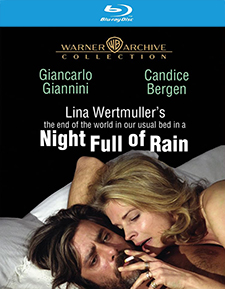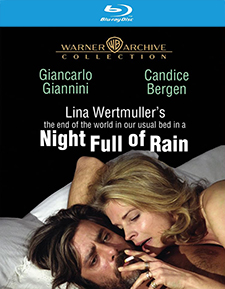End of the World in Our Usual Bed on a Night Full of Rain, The (Blu-ray Review)

Director
Lina WertmüllerRelease Date(s)
1978 (December 31, 2024)Studio(s)
Liberty Film/Canafox Films/Warner Bros. (Warner Archive Collection)- Film/Program Grade: C+
- Video Grade: A
- Audio Grade: A
- Extras Grade: F
Review
Only during the 1970s would a major Hollywood studio have co-financed Lina Wertmüller’s The End of the World in Our Usual Bed on a Night Full of Rain (La fine del mondo nel nostro solito letto in una notte piena di pioggia, 1978). The art house circuit thrived during that decade, so much so that, at first, Roger Corman’s New World Pictures realized high-quality pictures by Truffaut, Bergman, and Kurosawa could be inexpensively acquired, and used to provide a steady supply of movies to hardtop theaters when drive-ins closed for winter, these movies turning a modest but not insignificant profit. Eventually, bigger, established studios began co-financing films by the great, mostly European auteurs, such as Paramount’s financing of Ingmar Bergman’s The Serpent’s Egg (1977), and Fox’s partial bankrolling of Akira Kurosawa’s Kagemusha (1980). These filmmakers were usually given complete artistic control, and the results were, from a financial standpoint, almost uniformly disastrous. Wertmüller’s four-picture deal at Warner Bros. was quickly canceled. Today, such filmmakers would be offered a Marvel or Star Wars movie to direct instead.
Wertmüller’s movie, like The Serpent’s Egg, was filmed in English, its title usually abbreviated for advertising art and marquees to A Night Full of Rain or Night Full of Rain despite its actual, ungainly onscreen moniker, and operates from an intriguing premise. But this promising opening salvo is quickly undone; the movie is frustratingly shallow, even shrill, a grueling watch before it’s over. Even Wertmüller fans generally regard it as one of her worst films.
On vacation in Italy, feminist American photographer Lizzy (Candice Bergen) is watching a Catholic procession when she spots an abusive man beating his spouse. She tries to intervene, but is herself attacked, prompting Communist writer Paolo (Wertmüller’s regular leading man, Giancarlo Giannini) to rescue her. They’re attracted to one another physically, but like oil and water otherwise, he politically disillusioned and chauvinistic in the Italian manner, she liberated in theory but still ambitious and unformed. He follows her to her home in San Francisco and they eventually marry, moving back to Italy and into the mansion-like home of Paolo’s infirm aunt (whose existence is barely acknowledged in a single, brief appearance.)
The non-linear narrative bounces around in time, but unlike other films that do this, as varied as Slaughterhouse Five and Two for the Road, here there’s no clear purpose. Intriguingly, the “present-day” scenes have a prescient science fiction angle: that the man-made poisoning of the world’s oceans have triggered apocalyptic rainfall, that the world might literally be coming to an end. Wertmüller does nothing with this; the main characters are unaffected by this doomsday scenario and rather selfishly battle over their own relationship problems as the world goes to Hell in a handbasket, even largely ignoring the needs of their daughter (Alison Tucker, the real-life daughter of actors Michael Tucker and Jill Eikenberry, who both appear in the film in minor roles).
Candice Bergen is wonderful—as she often is, her wit and intelligence too infrequently tapped by filmmakers (her mother Francis was also rather underrated)—and the picture is handsomely photographed by Giuseppe Rotunno (The Leopard), with fine art direction—but it’s also superficial and unrewarding, even frustrating. Lizzie and Paolo argue and make love like Giannini and Mariangela Melato in Swept Away and other Wertmüller films, but the fact that she’s a feminist and he’s a chauvinist or that she’s a liberated American woman and he’s an Italian communist alpha male-type function more like window dressing. They insult one another and make long-winded, unnaturally-worded speeches while in bed or wandering from room-to-room but rarely actually talk about their political/cultural differences and thus rarely shedding any enlightenment on these characters. They don’t discuss their values or beliefs with one another, with other characters, and are mostly locked in that Italian house; we never see either of them at work or engaged with co-workers or associates. Except for the opening scenes, they feel hermetically isolated from the outside world.
Somewhat addressing this, Wertmüller adds a kind of Greek chorus, friends of the couple, whose function partly is to fill in some of the narrative gaps. A creepy presence, they voyeuristically hover about at various times, like ghosts, watching Lizzie and Paolo having sex, Paolo shaving etc., commenting on the action, giving these scenes the air of a group of friends huddled around a cellphone laughing contemptuously at TikTok videos. Paolo can’t see them but, at least at the end, Lizzie appears to be aware of their presence. Why?
An unexpected release from Warner Archive, their Blu-ray presents the film in its original 1.85:1 widescreen aspect ratio. The image quality is excellent, as well it should be; were more than 10 prints ever made for its U.S. release? The image is sharp, color naturalistic and accurate, and contrast and blacks look good. The DTS-HD Master Audio 2.0 mono (English only) is also above average, and supported by optional English subtitles. Though running only 104 minutes, the Blu-ray includes an intermission break (“End of first act,” “Second act”) though I wonder how many U.S. theaters actually took one.
There are no extra features at all, not even a trailer.
One of the very few prominent women filmmakers, Wertmüller, the first to be nominated for an Academy Award as Best Director, has her ardent admirers, but I don’t think her movies have aged as well as, say, Ida Lupino, Kinuyo Tanaka, and other women. The End of the World in Our Usual Bed on a Night Full of Rain begins with a strong, intriguing premise, but Wertmüller is unable to successfully flesh it out or makes its two main characters come alive in any real way. Nevertheless, I’m glad Warner Archive chose to make it available, disappointing though it is.
- Stuart Galbraith IV

